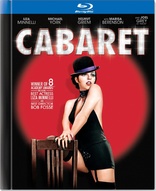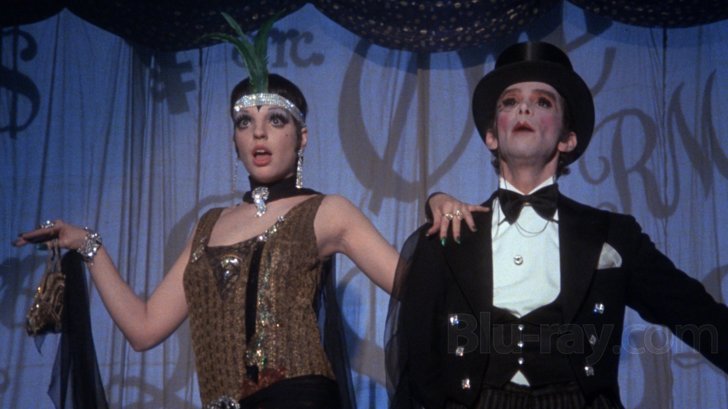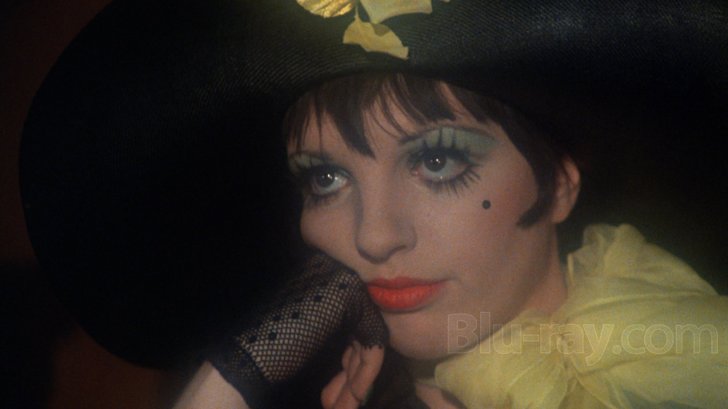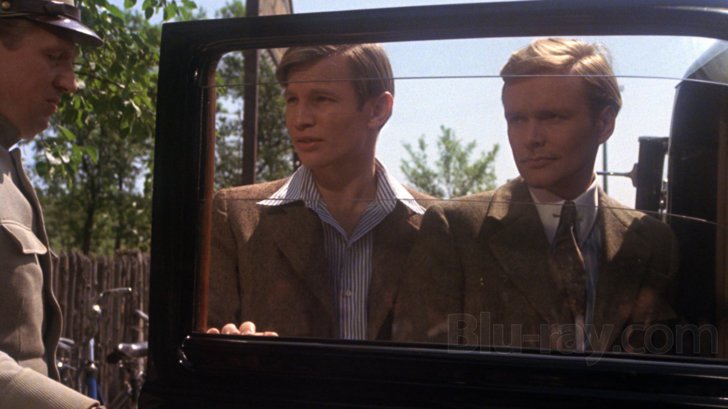Cabaret Blu-ray Movie
HomeCabaret Blu-ray Movie 
Warner Bros. | 1972 | 124 min | Rated PG | Feb 05, 2013
Movie rating
7.7 | / 10 |
Blu-ray rating
| Users | 4.2 | |
| Reviewer | 4.5 | |
| Overall | 4.5 |
Overview
Cabaret (1972)
A female entertainer at the Kit Kat Club of Weimar-era Berlin falls in and out of love with a visiting British scholar while the Nazi Party rises to power around them.
Starring: Liza Minnelli, Michael York, Helmut Griem, Joel Grey, Fritz WepperDirector: Bob Fosse
| Romance | Uncertain |
| Drama | Uncertain |
| Musical | Uncertain |
| Music | Uncertain |
| Period | Uncertain |
Specifications
Video
Video codec: MPEG-4 AVC
Video resolution: 1080p
Aspect ratio: 1.78:1
Original aspect ratio: 1.85:1
Audio
English: DTS-HD Master Audio 5.1 (48kHz, 24-bit)
Subtitles
English SDH, French, Spanish
Discs
50GB Blu-ray Disc
Single disc (1 BD)
Playback
Region free
Review
Rating summary
| Movie | 5.0 | |
| Video | 5.0 | |
| Audio | 4.0 | |
| Extras | 4.0 | |
| Overall | 4.5 |
Cabaret Blu-ray Movie Review
The UN-Musical
Reviewed by Michael Reuben January 25, 2013It's awe-inspiring to look back to the awards season of forty years past and see two cinematic achievements of the caliber of Cabaret and The Godfather vying for top honors. The Godfather may have taken home best picture, but its total haul was three Oscars to Cabaret's eight, including the best director statue for Bob Fosse, which was sweet vindication after Fosse's disastrous first outing as a filmmaker, Sweet Charity. Cabaret remains just as visceral and lively a piece of dramatic craftsmanship as it was when it first hit movie screens in 1972. It might be better known if there had been a decent video version available. Thankfully, one has finally arrived, courtesy of Warner Home Video and MPI, Warner's on-site post house that coincidentally also performed the digital resurrection of The Godfather. That Cabaret is based on a successful Broadway musical is almost incidental. Large stretches of the film play without song. Indeed, Fosse, his screenwriter, Jay Presson Allen, and various other collaborators, including songwriters Kander & Ebb (Chicago), so drastically reconceived the material for the screen that many fans of the stage show (and I'm one of them) never get further than complaining about the changes. But theater is one art form, and cinema is another. Fosse, who had worked in both, understood the differences in intimate detail, and he was determined to create a movie. He succeeded so brilliantly that, as one participant in the new documentary on the Blu-ray points out, Cabaret is the only movie musical that people who hate musicals usually like. No one in Cabaret bursts into song to express themselves. The five songs from the stage show that served such a function (the so-called "book" songs) were dropped. With one exception, the only songs that were retained were those sung by performers from the stage of the Kit Kat Klub, the seedy Berlin dive where one of the main characters, Sally Bowles, earned her meager living. Kander & Ebb wrote two additional songs suitable for the Kit Kat's stage and added a third from their existing repertoire. Allen's script was carefully structured so that the songs would comment, often ironically, on actions occurring outside the club. The effect was enhanced in the editing room, as Fosse and his editor, David Bretherton (another of the film's Oscar winners), used abrupt transitions, unexpected rhythms and jarring, rapid-fire cuts to keep the audience off balance. At every level, Cabaret is a technical marvel, but Fosse's perfectionism wasn't a matter of craftsmanship for its own sake. At the end of Casablanca, Humphrey Bogart's Rick famously tells Ilse that their problems don't amount to "a hill of beans" in light of the Nazi threat. Cabaret's characters can't see (or don't want to) beyond their hill of beans, even as that very threat masses ominously around them. Fosse draws you deeply into the world of those characters, but then he keeps breaking away to remind you of what they're ignoring. Ultimately, Cabaret's aim is to give the viewer an experience that answers the question that still puzzles so many: How could an entire nation have remained complacent while such dangerous people took over?

Three main threads wind through Cabaret, criss-crossing and looping over each other. The first is the friendship, and then love affair, between Sally Bowles (Liza Minnelli), the would-be actress with the oversize personality that disguises a perpetually broken heart, and Brian Roberts (Michael York), the repressed Englishman who arrives in 1931 Berlin to continue his studies and support himself by teaching English to Germans. Inquiring about a vacancy in the boarding house where Sally lives, Brian is greeted by Sally at the door and is instantly swept into her world of "divine decadence", as she beckons him inside with her brightly metallic green fingernails. Their relationship is by turns comical, touching and tragic, because the more they get to know each other, the more obvious it becomes that they are impossible as a couple. The second thread is Germany's descent into fascism. Cabaret is set just two years before the Nazis gained control of the German government, and their presence is inescapable throughout the film. Near the beginning, a Nazi supporter comes into the Kit Kat Klub, where Sally works, to solicit donations and is immediately ushered out by the manager. (Shortly after, we see the manager being beaten in an alley by Nazi sympathizers.) By the end of the film, the club's audience is filled with patrons wearing swastika armbands. In between, numerous scenes (and parts of scenes) attest to the gathering storm, even as Brian and Sally remain absorbed in their day-to-day lives. An especially chilling example occurs when Brian returns to the boarding house one day to find his sweet, friendly neighbors sitting together in the front room trading stories from the official Nazi press about the international conspiracy of Jewish bankers and communists. Later, one of Brian's pupils, Natalia Landauer (Marisa Berenson), is subjected to a vicious attack, because she is a member of a wealthy Jewish family. A subplot involving Natalia and a fortune hunter named Fritz (Fritz Wepper), who woos her for her money, then discovers to his amazement that he's fallen in love with his "mark", takes a dark turn, as Natalia's race becomes a matter of controversy. Among people with money and influence, nonchalance rules the day. We will take care of the Nazis, says Maximilian (Helmut Griem), the dissolute baron who briefly "adopts" Brian and Sally as his playmates, but first let them take care of the communists for us. (We all know how well that worked out.) The third and final thread is the Kit Kat Klub itself, the "cabaret" of the title, where Sally works while she deludes herself that she has a future as an actress. A surreal and seedy locale, the club is presided over by a mysterious figure known only as the Master of Ceremonies, or M.C. (Joel Grey), who welcomes us to the film with his famous greeting ("Willkommen, bienvenue, welcome!") and bids us farewell at the end. Over the years, people have speculated about the identity of the M.C., whose presence bears more than a small touch of the demonic, especially when director Fosse cuts to his grinning face at odd and unexpected moments. We never see the M.C. away from the club or fully out of makeup, and Joel Grey has steadfastly refused to comment on who he might be. One thing is for certain: When the M.C. is on screen, you cannot take your eyes off him. "Leave your troubles outside!" says the M.C. "In here, life is beautiful!" At one level, the M.C. represents the wilful narcosis that blinded so many of the people of Germany (and the world) to the Nazi threat. But at the same time, he presides over musical numbers that literally fling the problem in the audience's face, while he grins over their complacency (the most obvious example being "If You Could See Her"). Even when the club numbers seem to be commenting primarily on Brian and Sally (as in "Money" or "Two Ladies"), the M.C.'s sardonic delivery always hints at some larger game being played. Joel Grey won the Oscar for best supporting actor in competition against Al Pacino and Robert Duvall in The Godfather. Watch him weave his spell around the Kit Kat Klub stage if you want to understand why. Christopher Isherwood, on whose stories Cabaret was based, complained that Liza Minnelli was too talented to play Sally Bowles, who, in Isherwood's original conception, was supposed to be a third-rate performer with hopeless aspirations. Isherwood had a point, but Fosse understood how to use Minnelli's talent as a musical performer to create a different version of Sally Bowles, one who only exists as a creation on a stage and, once the lights go down, lapses back into an emotionally wounded creature so desperate that she lives her life as if playing a part. Between drinking, serial affairs and the endless lies Sally tells herself, there's barely anyone there, which is what dooms her relationship with Brian. Minnelli finds layer after layer of humor and pathos in this impossible creature and even makes her strangely appealing as she dances on the edge of a volcano that is gathering itself for an imminent eruption. The famous title song of Cabaret is often treated as an anthem to living for the moment and enjoying what's in front of you, and Minnelli, as Sally, gives it her all. Watch it in context, and pay attention to how Fosse follows it up, and you'll never be able to listen to it the same way again.
Cabaret Blu-ray Movie, Video Quality 

Warner's 1080p, AVC-encoded Blu-ray presentation of Geoffrey Unsworth's Oscar-winning cinematography for Cabaret is already drawing criticism for being "soft" and lacking in detail. At the risk of offending some posters, I'm simply going to declare at the outset that these criticisms are just wrong. This is a detailed image, as becomes immediately evident when one examines such well-lit scenes as the language lessons that Brian conducts in Sally's room, or Natalia Landauer's living room when Sally visits her, or the bedroom in Maximilian's castle where he tells Brian that blue is "his" color. Now, of course, when the environment is darker and the light is diffused by smoke, as is usually the case in the Kit Kat Klub, there is less detail on display and deliberately so. The principal artistic effect in such scenes is determined by strong contrasting colors, which the Blu-ray reproduces admirably, as well as by appropriately delineated shades of black, which the Blu-ray also reproduces accurately, showing figures in the dimly lit recesses of the club with just enough detail to create the desired effect. Perhaps the most painterly of Unsworth's compositions can be seen in the extended sequence at Maximilian's castle, where he, Sally and Brian drunkenly dance through the night, in a huge hall marked by pools of light and shadow. Here again, the issue is not whether one sees every hair follicle or furniture edge; it's whether one senses the unfamiliarity of the shadowy territory into which Sally and Brian have entered, now that they're in Maximilian's realm. The Blu-ray of Cabaret has a natural but unobtrusive grain structure and is free from obvious artifacts of any kind, whether through grain reduction, high frequency filtering, artificial sharpening or other manipulation. (Compression artifacts are also not an issue.) This ranks with the very best of the film-like transfers I have seen. That it should be criticized for "softness" is yet one more indication that Blu-ray viewers are beginning to lose any sense for the look of film in an era when digital acquisition and projection have changed the way cinema is perceived. Today, even those projects originally shot on film are immediately scanned, processed on digital intermediates (so that, in most cases, all trace of their celluloid origin is removed) and output to DCP ("digital cinema package") for theatrical distribution. Cabaret comes from an era when everything was analog, including shooting, editing, color timing and projection. That's how the Blu-ray presents it, and that's how it should look. I have scored the video accordingly.
Cabaret Blu-ray Movie, Audio Quality 

According to IMDb, Cabaret was originally released in "4-track stereo", which is the process that Fox introduced with its first Cinemascope epic The Robe and remained in use sporadically into the Eighties. This mix would have consisted of left, right, center and surround, and was presumably the basis for the 5.1 mix presented on the 1998 and 2006 DVDs and the Blu-ray's lossless DTS-HD MA 5.1 mix. The Blu-ray's track sounds terrific. The singer's voices (primarily Grey and Minnelli) are strong and clear, and the musical accompaniment strikes just the right balance between a raucous club band and an orchestral accompaniment. The dialogue in the non-musical scenes, which are the bulk of the film, is always clear and natural-sounding, and the sound effects, which often had to be woven carefully with the musical accompaniment, register with appropriate impact (another of the film's Oscars: best sound). The surround channel is used primarily to give the music an added presence for a few big effects like the trains passing overhead that Sally likes to use as cover for her version of "primal scream" therapy.
Cabaret Blu-ray Movie, Special Features and Extras 

Most of the supplements have been ported over from the DVD released by Warner in 1998 and reissued in 2006. The major additions are the commentary, a new documentary and the digibook packaging. These are marked with an asterisk.
- *Commentary by Stephen Tropiano: Tropiano is the author of a book entitled Cabaret: Music on Film. His commentary has an informal style and offers a good balance between the kind of basic information that newcomers to the film will appreciate (e.g., the origins of the story and the history of the stage musical) and the more arcane minutia that long-time fans will find interesting (e.g., Fosse's insistence on changing background extras, or how he got a specific reaction from actress Marisa Berenson). At times, Tropiano falls into the trap of describing the action on screen, but overall this is a worthwhile extra.
- *Cabaret: The Musical that Changed Musicals (1080p; 1.78:1; 28:40): This new documentary is as much a biography of Fosse as it is an account of the making of Cabaret. Because so few of the key creative personnel are still alive, the participants skew heavily toward secondary sources, including Fosse biographers Martin Gottfried and Sam Wasson, and Stephen Tropiano, who supplied the Blu-ray's commentary. Minnelli, Grey and York are interviewed (the latter sounding quite ill), as is songwriter John Kander and dancer Louise Quick. Bebe Neuwirth and Ben Vereen, who were directed by Fosse on other projects, supply their insights, as does Alan Heim, the editor of All That Jazz, and Rob Marshall, director of the film Chicago, of which Fosse was the original director on Broadway. The director's daughter, Nicole, also contributes. The documentary is narrated by Neil Patrick Harris, one of many musical theater stars who played the M.C. in the 1998 Broadway revival of Cabaret.
- Cabaret: A Legend in the Making (480i; 1.33:1; 17:31): This excellent documentary from 1997 includes interviews with numerous key players, many of whom are no longer with us, and chronicles the making of Cabaret from its initial greenlight through release and awards season.
- The Recreation of an Era (480i; 1.33:1; 6:04): If you can ignore the salesmanship of the narration, the chief appeal of this vintage EPK is the footage of Fosse working on set and on location.
- Kit Kat Klub Memory Gallery (480i; 1:33:1): These interview snippets appear to be items that didn't make it into the "Legend in the Making" documentary. They are nevertheless interesting, and some of them contain information about the making of Cabaret that you won't find in any of the other extras. The lack of a "play all" feature is unfortunate.
- Liza Minnelli Remembers
- Marisa's Close-Up (1:00)
- Sally's Look (1:55)
- Observing the Master (0:47)
- Joel Grey Reminisces
- Challenges (0:50)
- Collective Memory (1:05)
- Strange Inspiration (0:40)
- Michael York Remembers
- A Called Bluff (1:16)
- Risk Taking (0:34)
- Rush(es) Hour (0:35)
- A Happy Accident (0:31)
- Martin Baum Reminisces (former president of ABC Pictures)
- Rock 'n' Roll Editing (3:26)
- Isherwood's Surprise Reaction (1:27)
- Smithsonian Honor (0:38)
- Cy Feuer Reminisces
- Tomorrow Belongs to Me (1:12)
- Emanuel L. Wolf Remembers (head of Allied Artists Pictures)
- Taking on The Godfather (0:52)
- Timeless (0:29)
- John Kander Remembers
- Playing "What If?" (1:01)
- Almost a Nervous Breakdown (0:41)
- Sneaking a Peek (0:14)
- Jay Presson Allen Reminisces
- Play vs. Book (0:24)
- Recruiting Hugh Wheeler (0:14)
- Fred Ebb Remembers
- Screening Blues (1:12)
- Screening Hues (0:44)
- Theatrical Trailer (480i; 1.33:1; 2:56)
- *DigiBook: Warner's digibook packaging contains a useful history of the various works preceding the film, beginning with Isherwood's stories, as well as biographies of Minnelli, York, Grey, Fosse, Griem and Berenson.
Cabaret Blu-ray Movie, Overall Score and Recommendation 

Never underestimate the value of survival. Francis Coppola may have lost the best director Oscar to Fosse in 1973, but he lived to make two sequels to The Godfather, as well as Apocalypse Now, Bram Stoker's Dracula, Peggy Sue Got Married and numerous other critically well-received films. All the while, he continued to release and re-release The Godfather on home video, keeping it before the public eye and enhancing its reputation with each new improvement in the medium of video presentation. Fosse only had time to complete three more films before he died in 1987 at age 60 of a heart attack. Of the three, only one of them, the nakedly autobiographical All That Jazz, is an undisputed masterpiece, though it was poorly received at the time. Had Fosse survived to continue his restless experimentation on stage and screen and to champion the presentation of his previous works in what was, at the time of his death, still the fledgling home video market, Cabaret might be better known, and we might not have had to wait until now for a first-rate presentation of one of the 20th Century's greatest films. Highest recommendation.
Similar titles
Similar titles you might also like

Moulin Rouge!
2001

Burlesque
2010

Nine
2009

The Sapphires
2012

Jailhouse Rock
1957

Pal Joey
1957

A Star Is Born
1954

A Star Is Born
1976

Sweet Charity
1969

Rent
2005

The Phantom of the Opera
2004

My Fair Lady 4K
BD is Bonus Features
1964

Saawariya
2007

The Last Five Years
2014

New York, New York
1977

Across the Universe
2007

Funny Girl 4K
1968

Dreamgirls
2-Disc Showstopper Edition
2006

The Jazz Singer
1927

Smash: The Complete First Season
2012
